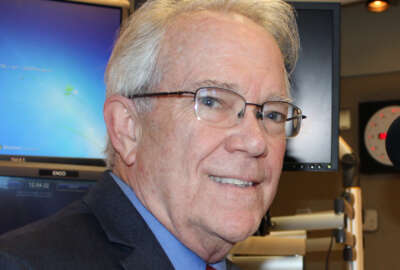

As DC anticipates a new CTO appointment interim boss articulates challenges, opportunities, new ERP initiatives, new CISO and impact of Amazon second headquaters'...
It’s like a state, it’s like a city — well, a federal city, that is. Washington, D.C.’s IT operations are headed up by Barney Krucoff, interim chief technology officer.
As anyone familiar with government IT knows the sector has fostered a plethora of “chiefs,” beginning innocuously enough with the chief information officer in the 1990s, then came the chief technology officer during the “aught years,” followed then by the chief information security officer. Fashionable of late have been the chief data officer, the chief innovation officer and, God help us, now the chief knowledge officer.
Back to Krucoff, he’s Washington’s CTO, however, with responsibilities most of us would usually ascribe to the CIO. And just to make it a little more complicated his appointment has been on an “interim” basis for the last year.
That being said we welcomed him to our Federal News Network studio recently for a discussion on the state of the city IT on Ask the CIO: SLED Edition.
Krucoff, like me, is an area native growing up in the city before pursuing higher education in city planning from Vanderbilt University and Georgia Tech. His career evolved toward GPS and he began his career with Washington as the city’s Geographic Information Systems manager. He then left for similar duties with the state of Maryland, but returned in 2016 as the national capital’s first — you guessed it — CDO. He was then appointed by Mayor Muriel Bowser in January as the city’s acting CTO.
From GIS manager, to CDO and CTO, Krucoff’s career path leading to the head of city-wide IT operations has been an interesting one. So we discussed how such a background prepared him for his current job.
“GIS was an area where data was expensive and exotic in the nineties when I started it,” he said. “It’s now on everybody’s phone. But we had a whole culture of data sharing and investment, working across jurisdictions to do maps.”
Such interdepartmental activities also accompanied his role as the evangelist for the critical importance of data, as CDO provided important lessons.

“My long time around the government has been helpful to just knowing the rules, knowing the people,” he said. It also didn’t hurt that his old boss, former Maryland Governor Martin O’Malley, was “very into his maps and I would sit in staff meetings at the highest levels of state government.”
Krucoff oversees the Office of the Chief Technology Officer, an organization with about 370 positions as well as more than 200 contractors onsite, and an annual budget of about $120 million.
As we explored the district’s CIO governance model, I learned that OCTO has rather interesting jurisdictional responsibilities with a broad operational role managing the primary infrastructure. That infrastructure includes a data center and network, many enterprise systems and cybersecurity.
However, many district agencies such as the Office of the Chief Financial Officer have a CIO who runs their financial management system that sits on an OCTO mainframe.
“So we support the infrastructure, they support the application,” Krucoff said. “There are other cases where we actually run both the infrastructure and the application and there are places where we touch neither.”
Many state and federal CIOs struggle with weak IT governance models which only have policy authority. They clamor for more operational responsibility. Ironically, Washington is the opposite.
“D.C. is a hybrid. While others government entities may have a relatively heavy policy shop, minus the operations, D.C. IT is actually a very operational entity,” Krucoff said. “But our policy side is a little bit diluted and agencies can have their own IT functions. So we’re almost the other side of the coin where we’re strong operationally and right now we’re trying to build back up the policy side.”
Krucoff emphasized that the national capital has a complex government organization — a combination city, state and county. Not to mention, “It’s one of the more complicated and larger governments you’re going to work in,” he said. “Even though the geographic area is relatively small, the range of things that the government covers is almost bigger than anywhere else except the federal government.”
In fact, in 2017 the Center for Digital Government found it tied with San Francisco for the third-biggest municipal budget nationwide with $10 billion. New York City was first with $73 billion.
Los Angeles came in fourth with $8 billion, followed by Chicago with $7 billion.
Source: Center for Digital Government/Amelia Brust, Federal News Network
Not surprisingly, Washington’s planned IT initiatives next year involve addressing the policy “gap.”
“One thing I’m trying to do is build back up that planning and governance function,” Krucoff said.
However, operational issues will not be ignored. Far from it. Major new initiatives involve systems modernization, beginning with a big lift: Replacing a decades-old accounting and financial system on the mainframe, replacing the purchasing system, and a new human resource management application.
“So a lot of legacy applications need to be modernized, moving a hosted model to a cloud model, and software as a service,” Krucoff said.
Any conversation with a government CIO, particularly at the state and local level, would not be complete without confronting the IT workforce issue. What makes matters more intriguing and more challenging was the fact that Amazon had recently announced that one of its new headquarters would be sited just across the Potomac River in Crystal City, Virginia, bringing an anticipated 25,000 new jobs.
Krucoff admitted concern but also a potential blessing.
“I’m nervous that they’ll hire some of our staff, but we hope they hire our citizens and residents,” he said. “We hope that some people who maybe move to the region will choose to live in the district.”
Finally, speaking of his organization Krucoff announced that OCTO had a new CISO in Suneel Cherukuri. Like Krucoff, Cherukuri had been in an acting capacity since January. I prodded my guest about his future.
While Krucoff said that he was not interested in the permanent CTO job, he did advise staying tuned as apparently an announcement is imminent.
“It’s not the right thing for my family right now. It’s a great job and I hope whoever gets it loves it,” he said. “I’m planning to go back to the chief data officer role, and help that person be successful for the city.”
Copyright © 2025 Federal News Network. All rights reserved. This website is not intended for users located within the European Economic Area.

